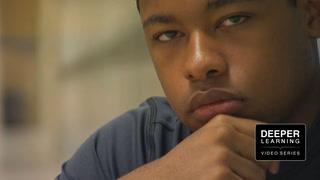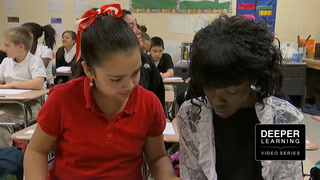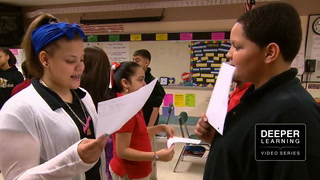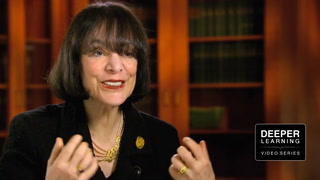Carol Dweck on Struggle Transcript
+++ 00:00:05 +++
Card:
Expeditionary
Learning
Expert commentary by:
Carol Dweck
+++ 00:00:10 +++
Carol Dweck: I'm Carol Dweck. I'm a professor of psychology at Stanford University.
Lower Third:
Carol Dweck
Professor of Psychology, Stanford University
Author, "Mindset"
+++ 00:00:18 +++
Carol Dweck: The growth mindset really converges with deeper learning. We have shown in our research that when students have a growth mindset, first of all, they are oriented toward learning. A growth mindset can be taught directly. We have studies where we've taught kids a growth mindset by teaching them that every time they push out of their comfort zone to learn hard new things, their brains form new connections. The neurons in their brains form new connections and over time, they get smarter.
+++ 00:00:58 +++
Carol Dweck: We show them how to apply that to their schoolwork, and in study after study, we've seen that the kids who learn this growth mindset earn higher grades than a control group. Expeditionary learning really incorporates a lot of my research. Even their motto, "Work hard, get smart, be nice." Work hard and get smart, that is a growth mindset. You're getting smarter through your work.
+++ 00:01:30 +++
Carol Dweck: There is so much emphasis on the good struggle, the big challenge, kids getting smarter by taking on things maybe they didn't even know they could master and then mastering them. I saw that students were proud of struggling with big, messy problems that they extracted meaning and solutions from, over long periods of time.
+++ 00:02:03 +++
Carol Dweck: In a fixed mindset, a mistake means, "Forget it. You're no good at this." It measures you. It says you're dumb. But in a growth mindset, that's a natural part of learning. Kids are interested in the mistakes, they're motivated by the mistakes. That's deeper learning. I love the student who was graduating, doing the speech. He said, "I am saying hello to the rest of my life, to my new life, based on what I learned here." He felt so empowered to go out
+++ 00:02:41 +++
there, but he knew that with this love of challenge, this taking on of difficult tasks and the tools he had learned to see that through with, that he could do well in any new setting. Every year, they are getting 100 percent of their students into college, so their approach is working. It's working to give kids a sense of purpose, a sense that they can contribute to
+++ 00:03:14 +++
society, and a sense that they have what it takes to meet a difficult and uncertain future, because they've done it over and over and over in that school.
#### End of DWECK_ELTS.m4v ####












11 Comments
Cecilia Grant Jan 15, 2024 9:53pm
A growth mindset could be taught by instilling positive energy into students through positive words and attitudes. For example, teachers could allow students to own their classroom by displaying positive thoughts and aspirations; encourage and model positive words: “I can make wise decisions”; “I can be kind to others”, “ I know that you can do it, let’s try again”. Also, let students know it is Ok to make mistakes.
A growth mindset perceives struggle as a stepping stone to success. In other words, a student will say: “ I will try again” rather than “ I cannot do it” or “ It is too hard”. Teacher could help students understand that making mistakes does not denote being foolish or slow but another way to deepen learning.
A growth mindset can build confidence to the extent that students feel comfortable asking questions for clarity without self-consciousness. In other words, their mind is focused on finding solutions to problems in order to achieve a high grade, not on what their peers think. A growth mindset pursue a challenge with the confidence of succeeding.
patrick ryan Jul 25, 2017 10:21am
Pamela Kennedy Sep 19, 2015 4:26am
Elma Castillo Aug 20, 2015 3:37pm
miz buchanan Nov 29, 2014 12:45pm